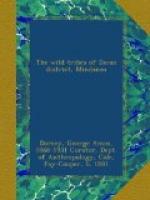LAWS. PROPERTY AND INHERITANCE.
The laws of the people are those imposed by custom and religion, and are equally binding on all classes. Public opinion is sufficient to prevent most crimes; the fear of offending the spirits is a further deterrent; while the final bar is the drastic punishment meted out by the datu. Theft is punished by the levying of a fine if the culprit is able to pay, or by a term of servitude if he has no property. If a husband finds that his wife has been unfaithful, he should kill both her and her admirer, but the spear with which he avenges his wrongs should be left in the body of one of the victims, as a sign that the murder was provoked by the fault. When this is done the husband cannot be held accountable either to the datu or to the dead person’s relatives. If, however, he withdraws the weapon, the brothers or other male relatives of the deceased have a right and a duty to avenge the deaths. A man who has killed his wife and her lover is allowed to count both on his score towards becoming a magani—a further incentive for him to avenge his wrongs. Cases are known where the husband accepted payment for his wife’s affections, but it was considered a sign of weakness, or cowardice, and the man lost caste. Unprovoked murder of one from the same or a friendly village is punished by death.
A man having illicit relations with a slave woman, not his own, is subjected to a heavy fine or a term of servitude. Incest should be punished by the death of the culprits for should such a crime go unpunished the spirits would cause the sea to rise and cover the land. Datu Tongkaling claims that on two occasions, since he became ruler, he has put such offenders to death. In the first case he had the couple bound and thrown into the sea, while in the second instance, they were tied to trees in the forest and sacrificed in the presence of all the people of the village.
Prohibitions exist against the wearing of the clothing which distinguishes warriors and priestesses, and there are rules governing the conduct of individuals while near shrines or during ceremonies, but punishment for the breaking of these rules is meted out by the spirits rather than by the datu.
Each settlement is recognized as having property rights to all adjacent lands. Within these recognized limits, its members may take up as much land as they need, provided it is not already in use, but when a field is, for any reason, abandoned it again becomes the property of the community. Individual ownership extends to houses, furnishings, and all articles of clothing, as well as to weapons, traps, animals, and slaves. Although bought with a price the wife is still very independent and has undisputed rights to her baskets, cooking utensils, looms, and to the finery with which she adorns her person.
Since all the people assist in the support of the datu they consider his home to be, to a certain extent, their own and make use of it and its furnishings without question.




